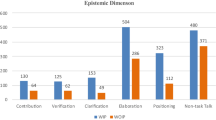Abstract
Research has argued that the way learning activities are sequenced over different social levels has an effect on learning effectiveness. This study investigates the effect of embedding an individual preparation phase prior to collaborative concept mapping (CCM) on the epistemic and social dimension of the CCM process. Using a quasi-experimental design, a multi-disciplinary group of 24 3rd year bachelor students were put into two different conditions: one with individual preparation phase (WIP) and one without individual preparation phase (WOIP). The students worked on a collaborative assignment about macro trends analysis using computer-assisted CCM. For the epistemic dimension, students in the WIP condition showed more occurrences of utterances seeking clarification and positioning one’s perspectives. In the social mode of knowledge construction, students in the WIP condition displayed more conflict-oriented and integrated consensus building statements to negotiate shared knowledge.
Access this chapter
Tax calculation will be finalised at checkout
Purchases are for personal use only
Similar content being viewed by others
References
Beers, P.J., Boshuizen, H.P., Kirschner, P.A., Gijselaers, W.H.: Common ground, complex problems and decision making. Group Decis. Negot. 15(6), 529–556 (2006)
Songer, N.B., Linn, M.C.: How do students’ views of science influence knowledge integration? J. Res. Sci. Teach. 28(9), 761–784 (1991)
Roschelle, J., Teasley, S.D.: The construction of shared knowledge in collaborative problem solving. In: O’Malley, C. (ed.) Computer Supported Collaborative Learning, pp. 69–97. Springer, Heidelberg (1995)
Roschelle, J., Clancey, W.J.: Learning as social and neural. Educ. Psychol. 27(4), 435–453 (1992)
Novak, J.D., Cañas, A.J.: The origins of the concept mapping tool and the continuing evolution of the tool. Inform. Visual. 5(3), 175–184 (2006)
Engelmann, T., Hesse, F.W.: How digital concept maps about the collaborators’ knowledge and information influence computer-supported collaborative problem solving. Int. J. Comput.-Supported Collaborative Learn. 5(3), 299–319 (2010)
Palincsar, A.S.: Social constructivist perspectives on teaching and learning. Annu. Rev. Psychol. 49(1), 345–375 (1998)
Scardamalia, M., Bereiter, C.: Knowledge Building. The Cambridge (2006)
Hewitt, J., Scardamalia, M.: Design principles for distributed knowledge building processes. Educ. Psychol. Rev. 10(1), 75–96 (1998)
Basque, J., Lavoie, M.C.: Collaborative concept mapping in education: major research trends. In: Proceedings of the Second International Conference on Concept Mapping, Costa Rica, pp. 79–86 (2006)
Stoyanova, N., Kommers, P.: Concept mapping as a medium of shared cognition in computer-supported collaborative problem solving. J. Interact. Learn. Res. 13(1), 111–133 (2002)
Schmid, R.F., McEwen, L.A., Locke, J., De Simone, C.: Use of electronic concept mapping in organizing, analyzing and representing complex knowledge-based information. In: American Educational Research Association Annual Meeting, New Orleans (2002)
Sizmur, S., Osborne, J.: Learning processes and collaborative concept mapping. Int. J. Sci. Educ. 19(10), 1117–1135 (1997)
van Boxtel, C., van der Linden, J., Roelofs, E., Erkens, G.: Collaborative concept mapping: provoking and supporting meaningful discourse. Theory Pract. 41(1), 40–46 (2002)
Gao, H.: The Effects of Key Concepts Availability and Individual Preparation in the Form of Proposition Formation in Collaborative Concept Mapping on Learning Problem Solving and Learner Attitudes. ProQuest Dissertations Publishing, Florida (2007)
Weinberger, A., Fischer, F.: A framework to analyze argumentative knowledge construction in computer-supported collaborative learning. Comput. Educ. 46(1), 71–95 (2006)
Collins, A., Brown, J.S., Newman, S.E.: Cognitive apprenticeship: teaching the crafts of reading, writing, and mathematics. In: Resnick, L.B. (ed.) Knowing, Learning, and Instruction: Essays in Honor of Robert Glaser, pp. 453–494. Lawrence Erlbaum Associates, Hillsdale (1989)
Rogoff, B.: Apprenticeship in Thinking. Oxford, New York (1990)
Cmap [Computer software] (2017). http://cmap.ihmc.us/cmaptools
Author information
Authors and Affiliations
Corresponding author
Editor information
Editors and Affiliations
Rights and permissions
Copyright information
© 2017 Springer International Publishing AG
About this paper
Cite this paper
de Weerd, J., Tan, E., Stoyanov, S. (2017). Fostering Interdisciplinary Knowledge Construction in Computer-Assisted Collaborative Concept Mapping. In: Lavoué, É., Drachsler, H., Verbert, K., Broisin, J., Pérez-Sanagustín, M. (eds) Data Driven Approaches in Digital Education. EC-TEL 2017. Lecture Notes in Computer Science(), vol 10474. Springer, Cham. https://doi.org/10.1007/978-3-319-66610-5_32
Download citation
DOI: https://doi.org/10.1007/978-3-319-66610-5_32
Published:
Publisher Name: Springer, Cham
Print ISBN: 978-3-319-66609-9
Online ISBN: 978-3-319-66610-5
eBook Packages: Computer ScienceComputer Science (R0)




